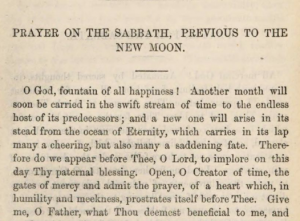| Contribute a translation | Source (English) |
|---|---|
O God, fountain of all happiness! Another month will soon be carried in the swift stream of time to the endless host of its predecessors; and a new one will arise in its stead from the ocean of Eternity, which carries in its lap many a cheering, but also many a saddening fate. Therefore do we appear before Thee, O Lord, to implore on this day Thy paternal blessing. Open, O Creator of time, the gates of mercy and admit the prayer, of a heart which, in humility and meekness, prostrates itself before Thee. Give me, O Father, what Thou deemest beneficial to me, and teach me to make the most sacred use of Thy gifts. Neither gold nor treasures, but cheerfulness and contentment, be my portion. Endow me with that firm belief in Thee which no affliction, no calamity, however dire, can shake. Bless me with a true unalloyed love, which is able to sacrifice a life for a friend, and to pardon the bitterest enemy. Send me, Creator of light, some cheering rays from Thy Throne of Light, that I may nearer lose my way, never wander from the straight road, but always adhere to the observance of Thy laws, and render myself worthy of Thy love. Bless me with hope, to look forward with full confidence to yonder regions where my soul may find all again that death here deprived it of. Bless me with peace of mind and repose of the soul, with love of justice and truth, so that with the coming month I may find myself brought much nearer the goal, for which I have to prepare myself here on earth. Be Thou, Omnipotent, my support and my staff, that I may live before Thee a life of righteousness, and that I may at all times obey the faithful council of Thy infinite wisdom. Amen. |
Source(s)


“Prayer on the Sabbath Previous to the New Moon, by Marcus Heinrich Bresslau (1852)” is shared through the Open Siddur Project with a Creative Commons Public Domain Dedication 1.0 Universal license.










Leave a Reply